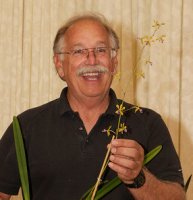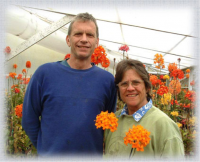- Home
- Meetings
- About
- Speaker Handouts
- 2025
- April 2025 - Arnold Gum ‘A Photo Tour of the Orchids and Lessons Learned from a Trip to Cali, Colombia and a Local Orchid Show'
- March 2025 - Alex Nadzan & Ed Danielewicz 'Orchid Culture - Repotting and Dividing Your Orchids'
- February 2025 - Fred Clarke ‘Cycnoches, Mormodes, Catasetums - Recent Trends’
- January 2025 - Phyllis Prestia and Fellow Judges on AOS Outreach Judging
- 2024
- December 2024 - Holiday Dinner
- November 2024 - Cindy Hill "My Top Ten Favorite Orchids and How to Grow Them"
- October 2024 - Dr. Mitchell Schneider "Wonderland: Inter-generic Zygopetalums"
- September 2024 - Peter T. Lin " Mini-Catts: Delightful Cattleyas in Miniature"
- August 2024 - Gil Ho, MD "Orchids in Flight: Stanhopeas Around the World"
- July 3, 2024 - Pot Luck Dinner and Orchid Plant Exchange
- June 2024 - Tim Culbertson "Laelia purpurata, Varieties and Hybrids"
- May 2024 - Jose Carlos Lopez "The Hidden Life of Catasetinae"
- April 2024 - Ron Midgett "Kaleidoscope: Breeding with Cattleya Horace ‘Maxima’ AM/AOS"
- March 2024 - Jerry Spencer and Alex Nadzan - Repotting and Dividing Your Orchids
- Growing Orchids in the Middle of a Drought
- January 2024 - Carol Beule
- 2023
- May 2023 – Fred Clarke
- April 2023 – Gilberto Castro
- March 2023 – Culture Class
- February 2023 – Brandon Tam
- January 2023 – Carol Klonowski
- December 2023 - Holiday Dinner
- November 2023 - George Hatfield's Webinar on "Cultural Techniques for Growing Award-Winning Cymbidiums'
- October 2023 – Doug Overstreet
- September 2023 – Tim Culbertson
- August 2023 – Satomi Kasahara
- July 2023 – Peter Lin
- June 2023 – Jack Zhu
- 2022
- November 2022 – Arnold Gum
- October 2022 – Peter Lin
- September 2022 – Jerry Spencer and Ken Campbell
- August 2022 – Rene Van Rems
- July 2022 – Scott McGregor
- June 2022 – Fred Clarke
- May 2022 – Carlos Lopez
- April 2022 – Alex Nadzan & Bill Wong
- March 2022 – Tim Culbertson
- February 2022 – Alex Nadzan & Jerry Spencer
- January 2022 – Betty Kelepecz
- 2021
- November 2021 – Ron Kaufmann
- October 2021 – Peter T. Lin
- September 2021 – Tim Culbertson
- August 2021 – Carlos Lopez
- July 2021 – Fred Clarke
- June 2021 – WELCOME BACK!
- May 2021 – Gary Yong Gee (online presentation)
- April 2021 – Glen Decker (online presentation)
- March 2021 – David Haelterman (online presentation)
- February 2021 – Courtney Hackney (online presentation)
- January 2021 – Ron Parsons (online presentation)
- 2020
- November 2020 – Ken Jacobson (online presentation)
- October 2020 – Lou Jost (online presentation)
- September 2020 — Arnold Gum (online presentation)
- August 2020 – Fred Clarke (online presentation)
- July 2020 – Peter Lin (online presentation)
- March 2020 - Orchid Culture Meeting
- February 2020 – Orchid Culture Meeting
- January 2020 – Mary Gerritsen
- 2019
- 2018
- 2017
- 2016
- November 2016 General Meeting – Tom Biggart
- October 2016 General Meeting – James Rose
- September 2016 General Meeting – Marni Turkel
- August 2016 General Meeting – Harold Koopowitz
- July 2016 General Meeting – Ron Parsons
- April 2016 – Paul Tuskes
- March 2016 – Kay Klausing
- February 2016 – Ron Midgett
- January 2016 – Orchid Culture Class with Alex Nadzan and Jerry Spencer
- 2015
- November 2015 – Phyllis Prestia
- October 2015 – Satomi Kasahara
- September 2015 – Brandon Tam
- August 2015 – Alek Zaslawski
- July 2015 – David Brown
- June 2015 – Francisco Miranda
- May 2015 - Fred Clarke
- April 2015 – Peter Lin
- March 2015 – Peter Tobias
- February 2015 - Ron Parsons
- January 2015 – Kay Klausing
- 2014
- November 2014 – Arnold Gum
- October 2014 – Paul Tuskes
- September 2014 – Fall/Winter Culture Panel Discussion
- August 2014 – Phyllis Prestia
- July 2014 - James Rose
- June 2014 - Bruce Kidd
- May 2014 – Auction Volunteer Orientation Meeting
- April 2014 - Culture Class with Jerry Spencer & Merle Robboy
- March 2014 – Fred Clarke
- February 2014 - Sandra Tillisch Svoboda
- January 2014 - Dan Newman
- 2013
- 2012
- 2011
- 2010
- Newsletter
- To Do Lists
- Calendar
- Event Photos
- Links
- Membership
- Contact Us













